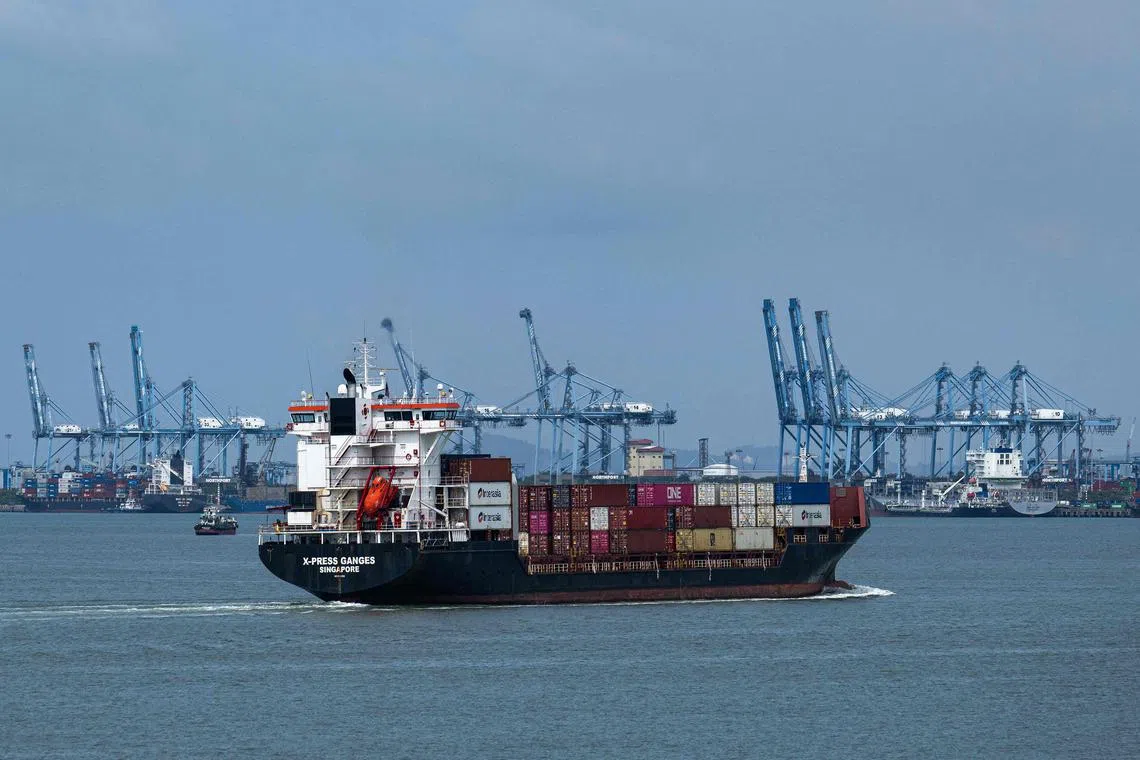Malaysia’s February exports fall 0.8%, imports jump 8.4%
Sign up now: Get ST's newsletters delivered to your inbox

Overall, Malaysia’s total trade increased 3.3 per cent year on year to RM211.7 billion in February.
PHOTO: AFP
Tan Ai Leng
Follow topic:
KUALA LUMPUR - Malaysia’s exports declined by 0.8 per cent year on year to RM111.3 billion (S$31.6 billion), dragged down by lower shipments of electronic and petroleum products, the Department of Statistics Malaysia said on March 18.
The decline missed the 2.4 per cent growth projected by 12 economists in a recent Reuters poll.
The latest figure reversed the previous month’s performance, which saw exports rebound 8.7 per cent year on year to RM122.4 billion, ending 10 consecutive months of contraction.
Imports in February, however, jumped 8.4 per cent from a year earlier, higher than the 7.8 per cent forecast by economists in the Reuters survey.
Overall, the country’s total trade increased 3.3 per cent year on year to RM211.7 billion in February.
Trade surplus was valued at RM10.9 billion, but this was 44 per cent lower than the RM19.6 billion in the same month a year earlier.
The Ministry of Investment, Trade and Industry expects global trade to improve in 2024, riding on better growth prospects for the world’s two largest economies – the United States and China.
“This improved global outlook would also be supported by stronger private and public spending, as well as increased labour force participation, improved supply chains and cheaper energy and commodity prices,” said the ministry in a statement on March 18.
For the first two months of 2024, the country’s total trade expanded 8.3 per cent year on year to RM446.4 billion. Exports and imports grew 3.4 per cent and 13.6 per cent, respectively.
In February, exports of manufactured goods – contributing 83.6 per cent of the total exports – slid 2.4 per cent year on year to RM93 billion.
This was due to lower shipments of electronic, petroleum and chemical products, offsetting export expansion for iron and steel, machinery and equipment, paper and pulp, as well as processed food products.
Shipments of agriculture products, which account for 6.1 per cent of total exports, declined by 4.8 per cent to RM6.8 billion from a year earlier, affected by lower shipments of palm oil products.
Exports of mining products, which form 9.7 per cent of total exports, rebounded 16.8 per cent to RM10.7 billion, driven by increased demand for liquefied natural gas and crude petroleum.
Exports to Singapore – the biggest destination market for Malaysia – fell 15.3 per cent year on year to RM15.7 billion,
This came on the back of lower exports of electronic and petroleum products.
Exports to China – contributing 12.8 per cent of total exports – declined 0.4 per cent to RM14.3 billion, due to lower shipments of electronic products as well as metalliferous ores and metal scrap.
Imports of capital and consumption goods increased 30.3 per cent and 19.7 per cent, respectively. Imports of intermediate goods rose 14.3 per cent.
Imports from China – forming 19.4 per cent of total imports – increased 0.1 per cent to RM19.5 billion. This was driven by higher orders for machinery, equipment and parts, as well as iron and steel products.
Imports from Singapore – accounting for 12.4 per cent of total imports – increased 29.5 per cent to RM12.5 billion, on higher demand for electronic and petroleum products, as well as machinery, equipment and parts.

